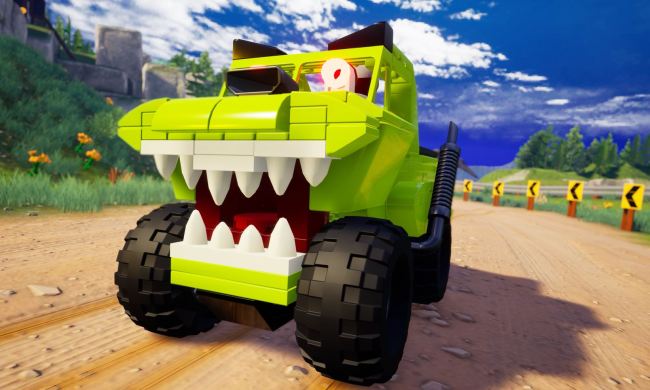With Pride Month here, there’s no better time to play a new game or two that focuses on LGBT+ characters and stories. Luckily, the number of games with LGBTQ+ representation has been growing over the last few years, particularly in the indie space. There’s a significant history of the queer community not getting represented in video games at all or in less than well-intentioned ways. And while there’s still plenty of room to grow in terms of queer storytelling in games, there are a host of fantastic games to pick from.
From games that feature queer main characters like The Last of Us Part II to titles that give players the freedom to build out their characters’ identities themselves like The Sims franchise, there are games across genres that have LGBTQ+ representation. Here’s a list of games that represent different queer identities, providing a good starting point if you’re looking to see how games tackle queer stories this Pride Month.
Note: Some spoilers are mentioned below.
The Last of Us Part II
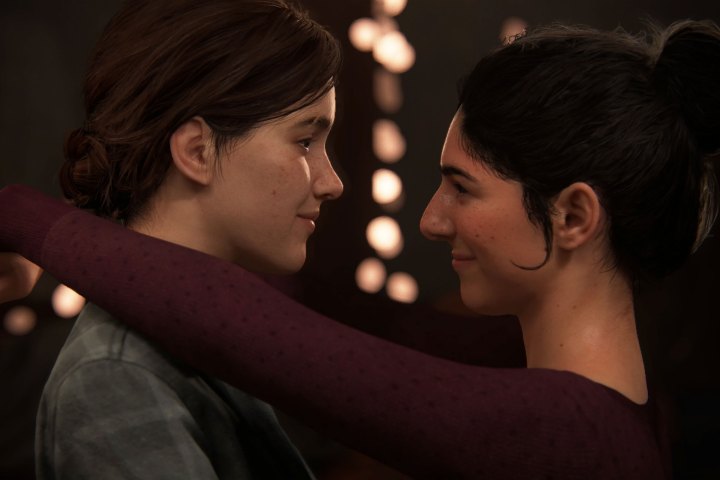
The Last of Us franchise from Naughty Dog is a postapocalyptic adventure survival game that primarily follows the story of several characters including Joel, Ellie, and later, Abby, 20 years after the world has been overrun by cannibalistic creatures. Since the first game released in 2013, the franchise has become critically acclaimed and a fan favorite across the board. It’s also known as one of the first more mainstream games to feature several queer characters.
Ellie is the central character for the franchise, and has proven to be a complex protagonist as she grapples with the dangerous and tragic world around her — including the loss of her best friend and first romantic interest, Riley. Ellie is the first lesbian main character in a triple-A title, and while she was by no means the first lesbian to be featured in a game, she was a bit of a groundbreaking character, particularly in The Last of Us Part II, which also featured queer characters in Dina and Lev, a trans man.
I Was A Teenage Exocolonist

Choices matter in this narrative-centered RPG that puts players in the shoes of protagonist Sol, a kid growing up on a space colony far from Earth. With a focus on deckbuilding, I Was A Teenage Exocolonist really puts the freedom of choice into your hands with the ability to build skills, take on what jobs you prefer, and focus on the relationships with other characters (including aliens) that you want to pursue. All of these decisions impact the current life you’re playing through and the next, courtesy of an in-game time loop.
Queer representation in I Was A Teenage Exocolonist is front and center. Players are able to customize Sol’s pronouns and their general appearance from the get-go and at any time throughout the game. Sol’s friends are all dateablem no matter the player’s own identity, should players want to pursue romance. But the cast also have individual identities of their own that impact how they maintain relationships among themselves, making for a diverse group of characters to interact with.
The Outer Worlds
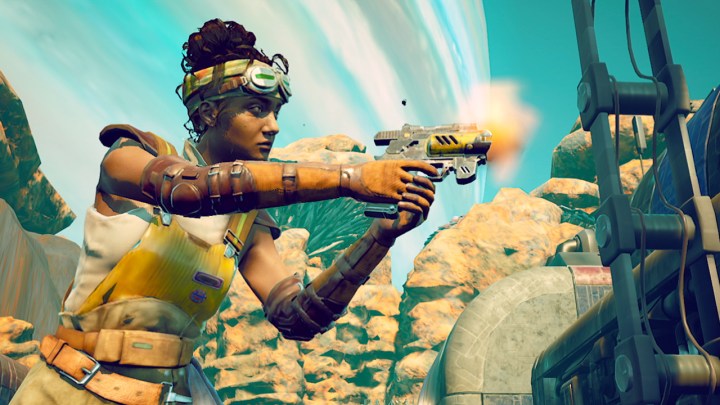
Players looking for more space adventures with queer representation can turn to The Outer Worlds. A single-player, character-driven RPG, The Outer Worlds is set in an alternate future where your player character finds themselves lost in space aboard a colonist ship that was meant to take you to a new world. After escaping the ship, you explore an open world, including some of the deepest reaches of space. But you also encounter the ongoing conspiracy that is threatening the Halcyon system and colony, all while meeting a ton of new characters – some of whom will become close companions.
One non-player character in particular who offers explicit queer representation is Parvati Holcomb. A potential companion to join you on your ship and a mechanic, Parvati has a personal quest that you can undertake. The quest reveals that Parvati has feelings for a woman named Junlei Tennyson, and you also find out through early conversation with Parvati that she is asexual. Parvati’s character and story has even been noted by GLAAD to be one of the “most prominent examples of an authentic asexual character ever seen in a major studio title.”
Hades
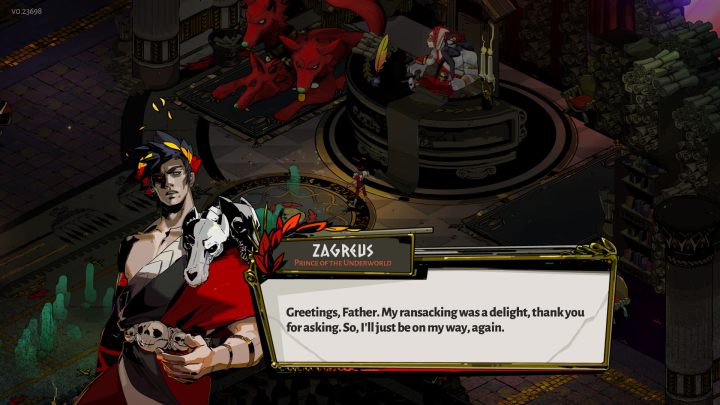
Released in 2020, Hades delivers big on both dungeon crawling and mythological adventure. Following the Greek demigod Zagreus, the story sees him attempting to escape from the underworld. Along the way, he faces plenty of battles and meets a host of Greek gods, monsters, and ghosts. Hades enjoyed both critical and commercial success following its release, earning several awards, including Best Game at the 2021 British Academy Game Awards.
Much like Ellie in The Last of Us, Hades also features a main character under the LGBTQ+ umbrella. Zagreus is bisexual, and as you play your way through the many dungeons, you will come across potential romances to pursue in Dusa, Thanatos, and Megaera. Hades centers queerness within the game, both through Zagreus and other relationships, such as the love story between Achilles and Patroclus.
Arcade Spirits
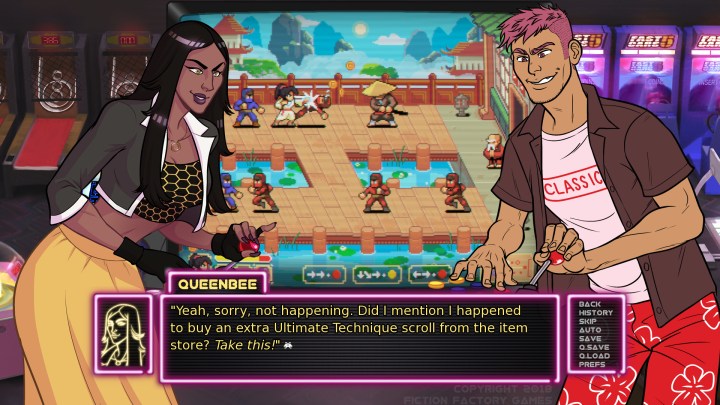
Arcade Spirits is a neon-fueled romantic visual novel that places the player character into an alternate timeline. Set in the year 20XX, you’re given the freedom to design your character before you find employment at a local arcade, the Funplex. The arcade is home to a number of different characters, from your co-workers Ashley and Naomi to Queen Bee and Percy, who are gamers and frequent visitors to the arcade.
Arcade Spirits is heavily choice-driven, prompting you often with decisions that keep you engaged and that have an impact on both your personality and the relationships you’ve developed with those at the arcade. How you choose to interact with everyone around you will ultimately impact your relationships and the overall ending of the game. There are seven potential romances for you to pursue, but Arcade Spirits also gives players the freedom to stick to just friendship.
Unpacking
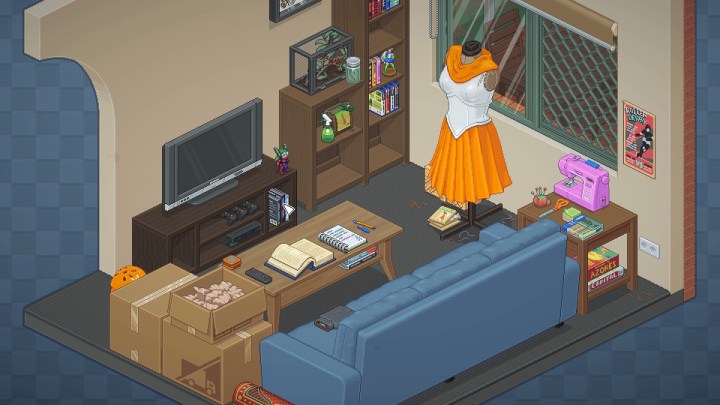
For the puzzle fans out there, Unpacking is a short and sweet game that’s all about the act of unpacking in new homes across an unseen character’s lifetime. Described as “part block-fitting puzzle, part home decoration,” Unpacking slowly reveals context clues as you unpack boxes in each new stage of life over the course of 20 years. Though the larger story is something you’re never told, the act of unpacking boxes and setting up each new home prompts you to pay close attention to the small details.
Some of those small (and not-so-small) details reveal that the unknown protagonist is bisexual, something you slowly learn throughout the game. During the process of moving and unpacking, the main character moves in with a boyfriend before going on to have a girlfriend move into her apartment later on. Unpacking is all about catharsis via puzzle play, and it focuses on a bisexual main character’s life in a very ordinary and fulfilling manner.
Stardew Valley

Stardew Valley is an indie title that pops up on many lists – those listing LGBTQ+ games, indie recommendations, and more. It’s a charming simulation RPG game where your character inherits their grandfather’s old farm. From there, players can farm, live off the land, explore, and customize the game to their heart’s delight. In a manner similar to The Sims, queer romance within the game is optional for players to pursue.
There are 12 romanceable townsfolk within Pelican Town, where players build out their inherited farm. Players are free to romance and date any of them, regardless of gender. Same-sex relationships are wholly accepted in Stardew Valley and queer couples can get married, adopt kids, and even get divorced. And some players have even expanded the queer representation through mods that help to add in queer-specific dialogue and even a Pride Month event.

